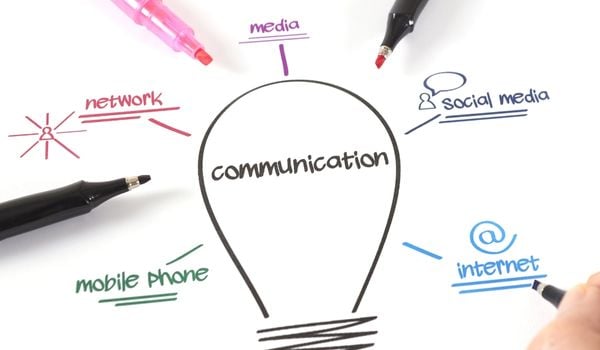The Impact of Tech on Client Interaction
As technology continues to advance, it has a significant impact on the way law firms interact with their clients. The use of technology-driven communication tools continues to revolutionize client interaction, enhancing both the experience and efficiency for all parties. These tools allow for seamless and convenient communication, eliminating the need for in-person meetings and reducing response times. However, law firms face challenges in finding the right balance between technology and personal touch. Maintaining meaningful client relationships is essential. Here, we explore how to find and maintain that balance.
Technology-Driven Communication Tools
Technology has undoubtedly revolutionized the way law firms interact with their clients, offering a wide range of benefits. The use of tech-enabled communication methods such as email, virtual meetings, and instant messaging has significantly enhanced client interaction, making it more seamless and efficient.
- Instant messaging platforms, whether texting or using some other app, facilitate real-time communication and collaboration, enabling lawyers to address urgent matters and discuss case details with their clients efficiently.
- Email provides a quick and convenient way to share information and important legal documents, providing updates and responses to client questions.
- Virtual meetings, on the other hand, eliminate the need for physical presence, saving time and travel expenses while allowing for more flexible scheduling.
It is crucial for law firms to strike the right balance between technology and personal touch, as building and maintaining meaningful client relationships is essential in the legal industry. By leveraging technology while also nurturing trust and rapport, law firms can maximize the benefits of tech-enabled communication methods and provide exceptional client service.
Pros and Cons of Instant Messaging Tools
Instant messaging tools are increasingly popular in the legal industry, offering law firms and their clients many benefits. With real-time communication and collaboration, lawyers and their clients can address urgent matters and discuss case details efficiently and securely. They also offer a quick and convenient way to share information. Some options let users share documents, images, and other content, too. Generally speaking, texting or other instant messaging apps like WhatsApp and Slack, are so commonly used by individuals, it's a natural evolution to expect the same when it comes to legal matters. Convenience, urgency, and our always-on society drive this heavy adoption.
Despite the benefits of texting or instant messaging, there are some drawbacks to consider. One of the main challenges are concerns related to privacy, security, and confidentiality. Client information must be protected at all times. The use of texting with tools that may not encrypt the information while traveling or at rest creates an opportunity for third-party view, especially on public networks. Sensitive discussions being held on an individual's cell phone leaves that information potentially viewable to others, too. Retaining information important to the matter is another issue. If the law firm or client or both are using options that are outside of matter documentation, these communications may be lost. If sharing documents, images, or other information on text, they may be missed in review or with documentation. Texting is certainly convenient for all. But it's a different conversation between an attorney and client than with friends or family sharing photos and grocery lists.
Pros and Cons of Email Messaging
Email has become an essential communication tool for law firms and their clients, offering a multitude of advantages. It provides a quick and convenient way to share important legal documents, updates, and responses to client questions. With email, lawyers can seamlessly communicate with their clients reducing response times. Similarly, clients can reach out to their attorney at any time.
There are drawbacks to consider when using email between law firms and their clients. While email providers provide data security, the networks over which those emails are sent can be at risk. The sheer number of emails that attorneys get from clients can be overwhelming. Are the messages being seen in a timely manner? Additionally, there is the issue of retaining important information related to the matter. If email communication is not properly archived or tracked against a matter, or if documents and other information are shared through email, they may be missed in review or lost.
Pros and Cons of Virtual Meeting Software
Virtual meeting software has become increasingly popular in law firms, offering a range of benefits for both lawyers and clients. With the ability to have real-time communication and collaboration, virtual meetings eliminate the need for physical presence, saving time and travel expenses. This convenience allows for more flexible scheduling, making it easier for clients to connect with their attorneys. Additionally, virtual meetings provide a personalized touch by allowing face-to-face interaction, which helps in building trust and rapport with clients.
To ensure all data is retained from these meetings, it's critical that the law firm creates notes from that discussion, adding them to the matter. A common practice, this potential 'con' is really just another aspect of managing matters.
Overcoming Negative Barriers
To overcome the potential cons of using technology-enabled client communication tools, technology is actually the answer. Look for software that delivers the benefit but delivers exceptional data security. Case management software platforms offer various solutions for each tool.
Best practices, as in health care portals, is to offer messaging within the software. Case management software, like SimpleLaw, offers just that. Think of it as a built in chat channel. All documents shared via the chat channel are automatically added to the related matter. Users are notified when a new message comes in. And the best part? It's all secure, inside the portal, just like healthcare and banking portals.
Email continues to be a well used and appreciated resource. However, it's easy to overuse the tool, too, leading to missed or delayed receipt of information. Look for software that integrates with email, and automatically attaches the email to the related matter. All communication related to each matter in one place.
The potential cons of virtual meetings, in my opinion, are very few. It's a far more efficient method to connect with clients in real time. Sure, some things must be in person and that is required for certain documents and procedures, not to mention important to really cement the attorney-client bond. But connecting virtually is a nice way to build client confidence and rapport.
Consider Client Preference
When considering client preferences for communication methods, law firms must take into account the importance of customization and personalization. Tailoring technology solutions to meet the unique needs and preferences of each client is key to ensuring exceptional client service.
Offering a range of communication options, such as phone calls, messaging through the portal, email, and virtual meetings, gives clients options to choose the approach that works best for them. After all, not everyone is happy to have a virtual meeting or communicate solely electronically.
To be successful, be sure to train and empower staff to use the technology to maintain strong client relationships. For example, what are best practices for a virtual call? Does the law firm have a preset background? Are individual's computers setup to provide a clear view and good sound quality? The same goes for email, phone calls, and chat. Decide what your firm's best practices are and be sure to make that standard operating procedure for all members of your firm.
Ultimately, building trust and rapport in the digital age is crucial for law firms. By fostering strong connections with clients through virtual means, law firms can create a sense of personal touch, enhance the overall client experience, and be efficient and secure, too.
.png)

